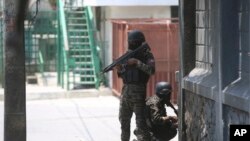A decree in Haiti's official gazette "Le Moniteur" on Friday announced the council's establishment, a month after Prime Minister Ariel Henry said he would step down amid a wave of attacks by armed gangs in the capital.
But a day later, the nine groups and political parties who will be represented on the council said they were "deeply shocked" by the text, saying it introduced "major modifications" to an agreement reached a week earlier.
In its decree, the outgoing government acknowledged the creation of the council, but did not mention its members by name.
The government then called on "the personalities designated by the stakeholders" to submit documents to authorities for approval.
That appeared to delay the setting up of the council, and stirred fears the government could reject some of the names.
Tuesday's decree in "Le Moniteur" seemed to partially address that concern by explicitly naming the seven voting members and two non-voting observers.
However, it also said that the members "will be required to submit the necessary documents within a reasonable timeframe, and that if they are unable to do so, they will be obliged to resign."
The council is meant to ensure a smooth transition as Henry—who has been Haiti's unelected leader since the 2021 assassination of president Jovenel Moise—leaves office, paving the way for new presidential elections to be held.
Haiti has not held elections since 2016. In the years since Moise's killing the impoverished nation has grappled with spiraling security and political crises.
Last year, a UN-backed force led by Kenya was tasked with deploying to the country and helping its beleaguered police rein in criminal gangs.
But the force has yet to deploy, even as humanitarian agencies plead for aid amid growing hunger, surging poverty and a lack of health care.
Henry was in Kenya in February trying to organize the deployment of the international force when gangs launched a coordinated attack and demanded the 74-year-old's resignation.
The ensuing explosion in violence saw foreigners evacuated and thousands of Port-au-Prince residents flee the city, even as aid agencies warned that infrastructure in other parts of the country could not support them.
After intense US and regional pressure, Henry agreed in March to step aside and facilitate the formation of the transitional council.








Forum